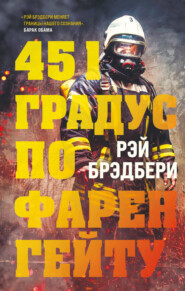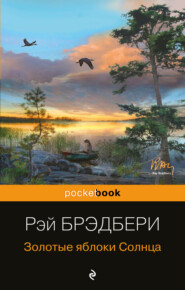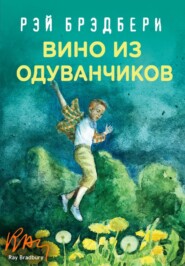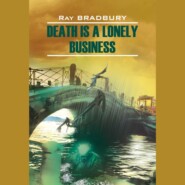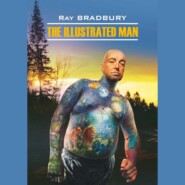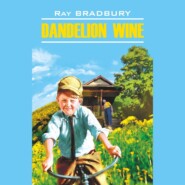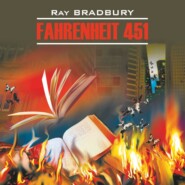По всем вопросам обращайтесь на: info@litportal.ru
(©) 2003-2025.
✖
Dandelion Wine
Автор
Год написания книги
2018
Настройки чтения
Размер шрифта
Высота строк
Поля
The darkness pulled back, startled, shocked, angry. Pulled back, losing its appetite at being so rudely interrupted as it prepared to feed. As the dark retreated like a wave on the shore, three children piled out of it, laughing.
‘Hi, Mom! Hi, Tom! Hey!’
It smelled like Douglas, all right. Sweat and grass and the odor of trees and branches and the creek about him.
‘Young man, you’re going to get a licking,’ declared Mother. She put away her fear instantly. Tom knew she would never tell anyone of it, ever. It would be in her heart, though, for all time, as it was in his heart for all time.
They walked home to bed in the late summer night. He was glad Douglas was alive. Very glad. For a moment there he had thought —
Far off in the dim moonlit country, over a viaduct and down a valley, a train rushed along whistling like a lost metal thing, nameless and running. Tom went to bed shivering, beside his brother, listening to that train whistle, and thinking of a cousin who lived way out in the country where that train ran now; a cousin who died of pneumonia late at night years and years ago —
He smelled the sweat of Doug beside him. It was magic. Tom stopped trembling.
‘Only two things I know for sure, Doug,’ he whispered.
‘What?’
‘Nighttime’s awful dark – is one.’
‘What’s the other?’
‘The ravine at night don’t belong in Mr Auffmann’s Happiness Machine, if he ever builds it.’
Douglas considered this awhile. ‘You can say that again.’
They stopped talking. Listening, suddenly they heard footsteps coming down the street, under the trees, outside the house now, on the sidewalk. From her bed Mother called quietly:
‘That’s your father.’
It was.
Late at night, on the front porch, Leo Auffmann wrote a list he could not see in the dark, exclaiming, ‘Ah!’ or, ‘That’s another!’ when he hit upon a fine component. Then the front-door screen made a moth sound, tapping.
‘Lena?’ he whispered.
She sat down next to him on the swing, in her nightgown, not slim the way girls get when they are not loved at seventeen, not fat the way women get when they are not loved at fifty, but absolutely right, a roundness, a firmness, the way women are at any age, he thought, when there is no question.
She was miraculous. Her body, like his, was always thinking for her, but in a different way, shaping the children, or moving ahead of him into any room to change the atmosphere there to fit any particular mood he was in. There seemed no long periods of thought for her; thinking and doing moved from her head to her hand and back in a natural and gentle circuiting he could not and cared not to blueprint.
‘That machine,’ she said at last, ‘… we don’t need it.’
‘No,’ he said, ‘but sometimes you got to build for others. I been figuring, what to put in. Motion pictures? Radios? Stereoscopic viewers? All those in one place so any man can run his hand over it and smile and say, “Yes, sir, that’s happiness.”’
Yes, he thought, to make a contraption that in spite of wet feet, sinus trouble, rumpled beds, and those three-in-the-morning hours when monsters ate your soul, would manufacture happiness, like that magic salt mill that, thrown in the ocean, made salt forever and turned the sea to brine. Who wouldn’t sweat his soul out through his pores to invent a machine like that? he asked the world, he asked the town, he asked his wife!
In the porch swing beside him, Lena’s uneasy silence was an opinion.
Silent now, too, head back, he listened to the elm leaves above hissing in the wind.
Don’t forget, he told himself, that sound, too, must be in the machine.
A minute later the porch swing, the porch, stood empty in the dark.
Grandfather smiled in his sleep.
Feeling the smile and wondering why it was there, he awoke. He lay quietly listening, and the smile was explained.
For he heard a sound which was far more important than birds or the rustle of new leaves. Once each year he woke this way and lay waiting for the sound which meant that summer had officially begun. And it began on a morning such as this when a boarder, a nephew, a cousin, a son or a grandson came out on the lawn below and moved in consecutively smaller quadrangles north and east and south and west with a clatter of rotating metal through the sweet summer grass. Clover blossoms, the few unharvested dandelion fires, ants, sticks, pebbles, remnants of last year’s July Fourth squibs and punks, but predominantly clear green, a fount leaped up from the chattering mower. A cool soft fount; Grandfather imagined it tickling his legs, spraying his warm face, filling his nostrils with the timeless scent of a new season begun, with the promise that, yes, we’ll all live another twelve months.
God bless the lawn mower, he thought. Who was the fool who made January first New Year’s Day? No, they should set a man to watch the grasses across a million Illinois, Ohio, and Iowa lawns, and on that morning when it was long enough for cutting, instead of ratchets and horns and yelling, there should be a great swelling symphony of lawn mowers reaping fresh grass upon the prairie lands. Instead of confetti and serpentine, people should throw grass spray at each other on the one day each year that really represents the Beginning!
He snorted at his own lengthy discussion of the affair, went to the window and leaned out into the mellow sunshine, and sure enough, there was a boarder, a young newspaperman named Forrester, just finishing a row.
‘Morning, Mr Spaulding!’
‘Give ’em hell, Bill!’ cried Grandpa heartily, and was soon downstairs eating Grandma’s breakfast, with the bay window open so the rattling buzz of the lawn mower lolled about his eating.
‘It gives you confidence,’ Grandpa said. ‘That lawn mower. Listen to it!’
‘Won’t be using the lawn mower much longer.’ Grandma set down a stack of wheat cakes. ‘They got a new kind of grass Bill Forrester’s putting in this morning, never needs cutting. Don’t know what they call it, but it just grows so long and no longer.’
Grandpa stared at the woman. ‘You’re finding a poor way to joke with me.’
‘Go look for yourself. Land’s sake,’ said Grandma, ‘it was Bill Forrester’s idea. The new grass is waiting in little flats by the side of the house. You just dig small holes here and there and put the new grass in spots. By the end of the year the new grass kills off the old, and you sell your lawn mower.’
Grandpa was up from his chair, through the hall, and out the front door in ten seconds.
Bill Forrester left his machine and came over, smiling, squinting in the sun. ‘That’s right,’ he said. ‘Bought the grass yesterday. Thought, while I’m on vacation I’d just plant it for you.’
‘Why wasn’t I consulted about this? It’s my lawn!’ cried Grandfather.
‘Thought you’d appreciate it, Mr Spaulding.’
‘Well, I don’t think I do appreciate it. Let’s see this confounded grass of yours.’
They stood by the little square pads of new grass. Grandpa toed at it with one end of his shoe suspiciously. ‘Looks like plain old grass to me. You sure some horse trader didn’t catch you early in the morning when you weren’t fully awake?’
‘I’ve seen the stuff growing in California. Only so high and no higher. If it survives our climate it’ll save us getting out here next year, once a week, to keep the darned stuff trimmed.’
‘That’s the trouble with your generation,’ said Grandpa. ‘Bill, I’m ashamed of you, you a newspaperman. All the things in life that were put here to savor, you eliminate. Save time, save work, you say.’ He nudged the grass trays disrespectfully. ‘Bill, when you’re my age, you’ll find out it’s the little savors and little things that count more than big ones. A walk on a spring morning is better than an eighty-mile ride in a hopped-up car, you know why? Because it’s full of flavors, full of a lot of things growing. You’ve time to seek and find. I know – you’re after the broad effect now, and I suppose that’s fit and proper. But for a young man working on a newspaper, you got to look for grapes as well as watermelons. You greatly admire skeletons and I like fingerprints; well and good. Right now such things are bothersome to you, and I wonder if it isn’t because you’ve never learned to use them. If you had your way you’d pass a law to abolish all the little jobs, the little things. But then you’d leave yourselves nothing to do between the big jobs and you’d have a devil of a time thinking up things to do so you wouldn’t go crazy. Instead of that, why not let nature show you a few things? Cutting grass and pulling weeds can be a way of life, son.’
Bill Forrester was smiling quietly at him.
‘I know,’ said Grandpa, ‘I talk too much.’
‘There’s no one I’d rather hear.’
‘Lecture continued, then. Lilacs on a bush are better than orchids. And dandelions and devil grass are better! Why? Because they bend you over and turn you away from all the people and the town for a little while and sweat you and get you down where you remember you got a nose again. And when you’re all to yourself that way, you’re really yourself for a little while; you get to thinking things through, alone. Gardening is the handiest excuse for being a philosopher. Nobody guesses, nobody accuses, nobody knows, but there you are, Plato in the peonies, Socrates force-growing his own hemlock. A man toting a sack of blood manure across his lawn is kin to Atlas letting the world spin easy on his shoulder. As Samuel Spaulding, Esquire, once said, ‘Dig in the earth, delve in the soul.’ Spin those mower blades, Bill, and walk in the spray of the Fountain of Youth. End of lecture. Besides, a mess of dandelion greens is good eating once in a while.’






